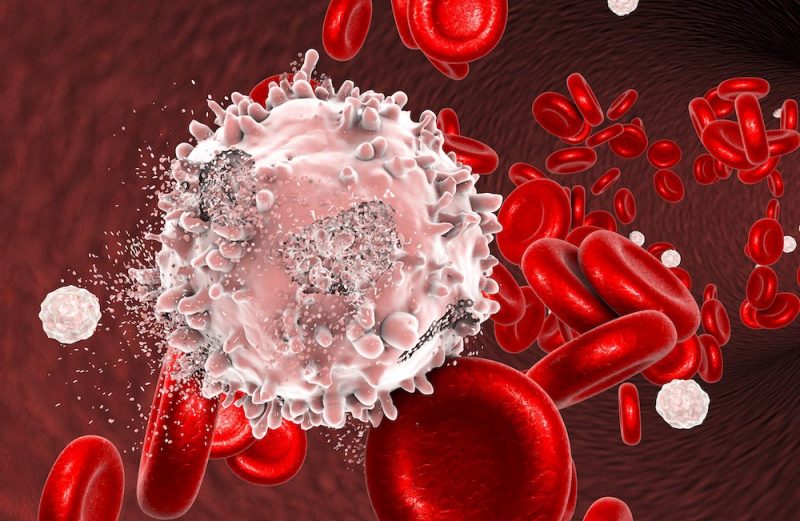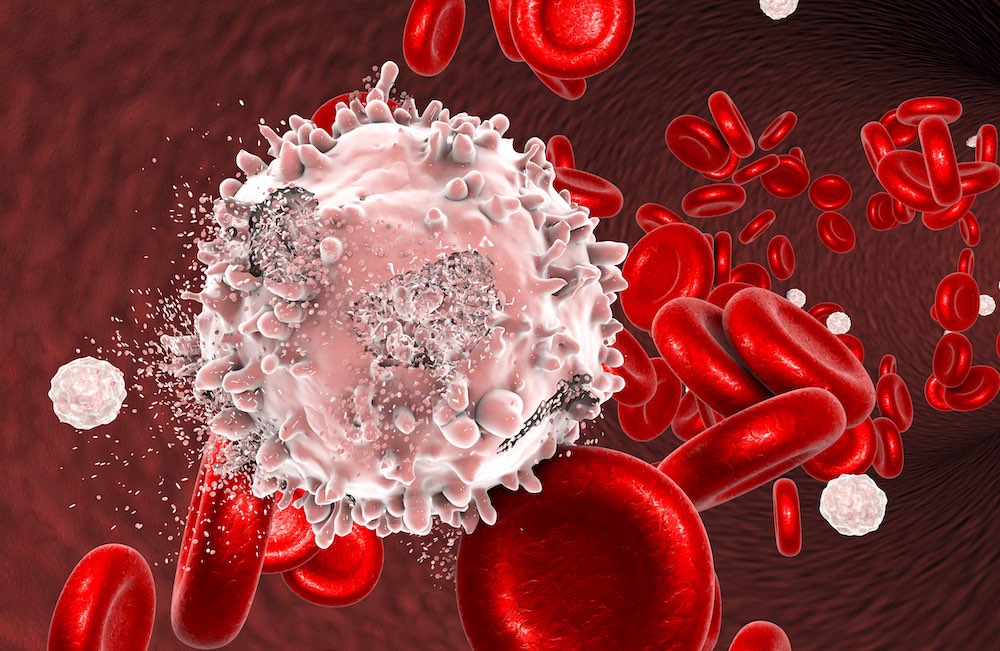Treatment with the second-generation Bruton tyrosine kinase (BTK) inhibitor acalabrutinib plus the BCL2 inhibitor venetoclax (with or without the CD20 inhibitor obinutuzumab), delivered as fixed-duration therapies, significantly improved progression free survival in comparison with standard-of-care chemotherapy in previously untreated patients with chronic lymphocytic leukaemia (CLL). Results from the AMPLIFY study, presented at the 2024 ASH Annual Meeting, held December 7–10 in San Diego, California, showed that, compared to standard-of-care chemotherapy, acalabrutinib plus venetoclax with obinutuzumab delivered a 58% reduction in risk of disease progression or death. Without obinutuzumab, the combination of acalabrutinib plus venetoclax reduced risk of disease progression or death by 35%.
“AMPLIFY is a registration trial that provides the first phase 3 evidence of fixed-duration therapy with a combination of venetoclax and a second-generation BTK inhibitor in patients with treatment-naïve CLL,” said Jennifer Brown, from Dana Farber Cancer Institute, Boston. The results, she added, show promise for a new fixed-duration therapy approach with second-generation BTK inhibitors.
CLL, the most common form of leukaemia occurring in adults in Western countries, is a monoclonal disorder characterised by progressive proliferation and accumulation of mature, yet functionally incompetent, lymphocytes. Several frontline treatment options are available for patients with CLL, including chemo-immunotherapy for low-risk disease and BTK inhibitors, which work by targeting the overactive BTK protein on CLL cells to hinder growth. Other treatment options include venetoclax (blocking the anti-apoptotic B-cell lymphoma-2 [Bcl-2] protein, leading to programmed cell death of CLL cells) and obinutuzumab (a monoclonal antibody targeting the CD20 protein).
While indefinite treatment with venetoclax or BTK inhibitors can result in deep, durable responses, cardiac toxicity with continuous BTK inhibitors has been of particular concern. The first-generation BTK inhibitor, ibrutinib, has been associated with some off-target effects through activation of other tyrosine kinases, leading to specific side effect profiles, which include cardiovascular toxicity. The second-generation BTK inhibitor, acalabrutinib, was developed with the goal of increasing specificity to the BTK enzyme.
“BTK inhibitors, both first-generation ibrutinib and the second-generation acalabrutinib, are most often used as continuous single agents,” Brown explained to Cancerworld. “The ibrutinib/ venetoclax combination is licensed as a fixed-duration treatment in Europe, but not in the US.” AMPLIFY, she added, is the first randomised study to evaluate a fixed-duration regimen of venetoclax with the second-generation BTK inhibitor acalabrutinib. “Fixed-duration regimens allow patients living with CLL to take breaks from their treatment, thereby decreasing the possibility of long-term adverse events and drug resistance,” she explained.
The study included 867 CLL patients who had undergone no previous treatment for the disease. All patients met the criteria for requiring therapy, as specified at the International Workshop on CLL 2018, and did not exhibit the high-risk genetic aberrations of chromosome 17p deletion or TP53 mutation. They were randomised 1:1:1 to acalabrutinib in combination with venetoclax alone (n=291, doublet therapy); acalabrutinib and venetoclax with obinutuzumab (n=286, triplet therapy); or the investigators’ choice of chemo-immunotherapy (n=290, control chemo-immunotherapy), which was a combination of fludarabine-cyclophosphamide-rituximab or bendamustine-rituximab.
The median follow-up was 41 months. Both the acalabrutinib containing arms were administered for a fixed duration of 14 cycles (each lasting 28 days), and chemotherapy was for six cycles. The primary endpoint was progression free survival, assessed by blinded independent central review, comparing acalabrutinib plus venetoclax to chemo-immunotherapy. Patients were recruited from 27 countries across North and South America, Europe, Asia and Oceania.
At a median follow up of 40.8 months, the median progression free survival was not reached in the doublet or triplet arms, and was 47.6 months in the control arm of standard-of-care chemo-immunotherapy.
Treatment with doublet therapy reduced the risk of disease progression or death by 35% (HR=0.65; 95%CI 0.49–0.87; P=0.0038), and treatment with triplet therapy reduced the risk of disease progression or death by 58% (HR=0.42; 95%CI 0.30–0.59; P<0.0001), in comparison to control chemo-immunotherapy.
Serious adverse events occurred in 24.7% of patients who received doublet therapy, in 38.4% who received triplet therapy, and 27.4% who received control chemo-immunotherapy. A low white blood cell count was the most common serious adverse event across all three arms.
Evaluation of heart toxicity showed that 9.3% of patients in the doublet arm, 12.0% in the triplet arm, and 3.5% in the control arm experienced a cardiac event. Rates of grade 3 or higher cardiac events occurred in 1.7% of patients in the doublet arm and 2.5% in the triplet arm versus 1.2% in the control arm. Rates of grade 3 or higher atrial fibrillation were low (0.3% vs 0.7% vs 0.8%), as was hypertension (2.7% vs 2.1% vs 0.7%).
“AMPLIFY showed that the fixed duration of acalabrutinib plus venetoclax, with or without obinutuzumab, was very effective and well tolerated with low cardiac toxicity,” said Brown. “The acalabrutinib plus venetoclax regimen could be given to almost any CLL patient, even those with other comorbidities, while the addition of obinutuzumab should probably be reserved for fitter patients.”
Notably, AMPLIFY was undertaken during the era of the Covid-19 pandemic, with 10 patients in the doublet arm, 25 in the triplet arm, and 21 in the control chemo-immunotherapy arm dying from Covid complications. “The addition of obinutuzumab to acalabrutinib and venetoclax improved efficacy, but also led to more adverse effects and more Covid deaths. Our next steps will include trying to better understand which patients get the most benefit from adding obinutuzumab and what factors lead to some patients relapsing sooner,” said Brown.
Currently, the ongoing MAJIC trial (NCT05057494) is comparing the efficacy of the combination of acalabrutinib plus venetoclax versus obinutuzumab plus venetoclax. “This trial will help to finalise the current optimal time-limited regimen. Future approaches could look at whether the addition of bispecific antibodies for consolidation, for example, could further increase efficacy,” said Brown.












